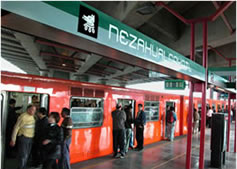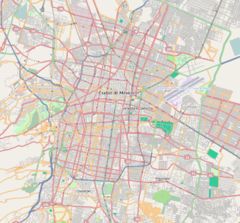Nezahualcóyotl metro station
| STC rapid transit | |||||||||||
 Train at platform | |||||||||||
| General information | |||||||||||
| Location | Ciudad Nezahualcóyotl Mexico | ||||||||||
| Coordinates | 19°28′23″N 99°03′16″W / 19.473066°N 99.054537°W | ||||||||||
| Line(s) | |||||||||||
| Platforms | 1 island platform | ||||||||||
| Tracks | 2 | ||||||||||
| Construction | |||||||||||
| Structure type | At grade | ||||||||||
| History | |||||||||||
| Opened | 30 November 2000 | ||||||||||
| Previous names | Continentes | ||||||||||
| Passengers | |||||||||||
| 2023 | 6,783,680[1] | ||||||||||
| Rank | 63/195[1] | ||||||||||
| Services | |||||||||||
| |||||||||||
| |||||||||||
Nezahualcóyotl is a station on Line B of the Mexico City Metro system.[2][3] It is located in Ciudad Nezahualcóyotl in the State of Mexico adjacent to Mexico City.[2]
The logo for the station is the head of a coyote since Nezahualcóyotl is Nahuatl for "hungry coyote", it is similar to the seal of Ciudad Nezahualcóyotl.[2][3] The station was opened on 30 November 2000.[4]
From 2000 to 2002 the station name was Continentes (Spanish for "continents"), due to the station being near the Boulevard de los Continentes, and the icon of the station was a Mollweide projection. In 2002, it was decided to change the name of the station to Nezahualcóyotl, to reflect the name of the municipality that is crossed by this specific station.[5]
Exits
- North: Av. Central and Boulevard de los Continentes, Col. Vergel de Guadalupe
- Northeast: Av. Central and Boulevard de los Continentes, Col. Vergel de Guadalupe
- South: Av. Central and Av. Jorge Jiménez Cantú, Col. Vergel de Guadalupe
- Southeast: Av. Central and Av. Jorge Jiménez Cantú, Col. Vergel de Guadalupe
Ridership
| Annual passenger ridership | |||||
|---|---|---|---|---|---|
| Year | Ridership | Average daily | Rank | % change | Ref. |
| 2023 | 6,783,680 | 18,585 | 63/195 | +14.05% | [1] |
| 2022 | 5,947,863 | 16,295 | 65/195 | +39.66% | [1] |
| 2021 | 4,258,836 | 11,668 | 71/195 | +57.13% | [6] |
| 2020 | 2,710,341 | 7,405 | 131/195 | −67.65% | [7] |
| 2019 | 8,378,849 | 22,955 | 65/195 | +3.22% | [8] |
| 2018 | 8,117,663 | 22,240 | 74/195 | +0.08% | [9] |
| 2017 | 8,111,393 | 22,222 | 70/195 | −7.78% | [10] |
| 2016 | 8,795,582 | 24,031 | 63/195 | −1.37% | [11] |
| 2015 | 8,917,944 | 24,432 | 62/195 | +1.30% | [12] |
| 2014 | 8,803,387 | 24,118 | 63/195 | −4.12% | [13] |
References
- ^ a b c d "Afluencia de estación por línea 2023" [Station traffic per line 2023] (in Spanish). Sistema Transporte Colectivo Metro. 2024. Archived from the original on 27 January 2024. Retrieved 24 January 2024.
- ^ a b c "Nezahualcóyotl" (in Spanish). Archived from the original on 27 April 2011. Retrieved 5 August 2011.
- ^ a b Archambault, Richard. "Nezahualcóyotl » Mexico City Metro System". Retrieved 5 August 2011.
- ^ Monroy, Marco. Schwandl, Robert (ed.). "Opening Dates for Mexico City's Subway". Retrieved 5 August 2011.
- ^ "¿Por qué algunas estaciones del Metro cambiaron de nombre?". El Universal (in Spanish). July 14, 2017. Retrieved August 21, 2018.
- ^ "Afluencia de estación por línea 2021" [Station traffic per line 2021] (in Spanish). Sistema Transporte Colectivo Metro. 2020. Archived from the original on 7 March 2022. Retrieved 7 March 2022.
- ^ "Afluencia de estación por línea 2020" [Station traffic per line 2020] (in Spanish). Sistema Transporte Colectivo Metro. 2021. Archived from the original on 21 June 2021. Retrieved 21 June 2021.
- ^ "Afluencia de estación por línea 2019" [Station traffic per line 2019] (in Spanish). Sistema Transporte Colectivo Metro. 2020. Archived from the original on 8 April 2020. Retrieved 3 May 2020.
- ^ "Afluencia de estación por línea 2018" [Station traffic per line 2018] (in Spanish). Sistema Transporte Colectivo Metro. 2019. Archived from the original on 6 June 2019. Retrieved 7 April 2020.
- ^ "Afluencia de estación por línea 2017" [Station traffic per line 2017] (in Spanish). Sistema Transporte Colectivo Metro. 2019. Archived from the original on 3 May 2020. Retrieved 3 May 2020.
- ^ "Afluencia de estación por línea 2016" [Station traffic per line 2016] (in Spanish). Sistema Transporte Colectivo Metro. 2017. Archived from the original on 3 May 2020. Retrieved 3 May 2020.
- ^ "Afluencia de estación por línea 2015" [Station traffic per line 2015] (in Spanish). Sistema Transporte Colectivo Metro. 2016. Archived from the original on 3 May 2020. Retrieved 6 May 2020.
- ^ "Afluencia de estación por línea 2014" [Station traffic per line 2014] (in Spanish). Sistema Transporte Colectivo Metro. 2015. Archived from the original on 3 May 2020. Retrieved 6 May 2020.


